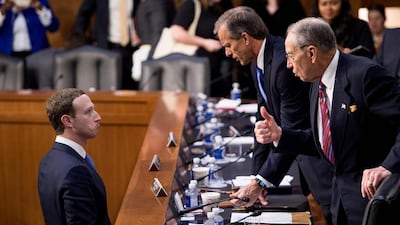As Facebook founder Mark Zuckerberg came under the scrutiny of the US Senate this week, the matter at the heart of the investigation into his company was big data: its collection, protection, distribution and monetisation. We now know that between 2010 and 2015, as Facebook placed its focus on aggressive growth, the data of its users was being scooped up by third parties. More disturbingly, the information that was harvested was not limited to users whose consent had been procured. It extended to all their connections, affecting tens of millions of Facebook users, whose data ended up in the hands of Cambridge Analytica.
The questions thrown at Mr Zuckerberg by the 44 largely elderly senators, however, revealed how out of touch they were as they bombarded him with queries that showed many struggled to get their heads around basic technology. This raises an important issue: if potential lawmakers cannot grasp the significance of big data, how can they possibly legislate on how to regulate it?
What was squandered was an opportunity to probe Mr Zuckerberg about the protection and future of that data. Facebook and other technology giants are behemoths that businesses small and large depend on for targeted advertising. There is the question of who is qualified to serve as a regulator. Evidently, tech companies have failed to self-regulate and lawmakers do not seem to have enough expertise to act as competent overseers. We are in an age where information sources are no longer limited to traditional media, who acted as gatekeepers and upheld accepted codes of conduct. Everyone is now a publisher or potential source of information. An independent regulatory body made up of government officials, members of the public and technical experts could be an option but when individuals carry the responsibility of deciding what counts as private, problems can arise. This was demonstrated within the Congressional hearing, where senators could not agree among themselves. Mr Zuckerberg has said he is not averse to the "right" regulation – but who decides what is "right"? Equally, a failure to protect social media users leaves them at the mercy of big corporations. Nevertheless, the story of Facebook so far is a lesson in the need for regulation. What began as a tool offering connectivity through sharing has soured and instead become an instrument for potential harm. Its damage needs to be limited before it is irreparable.

